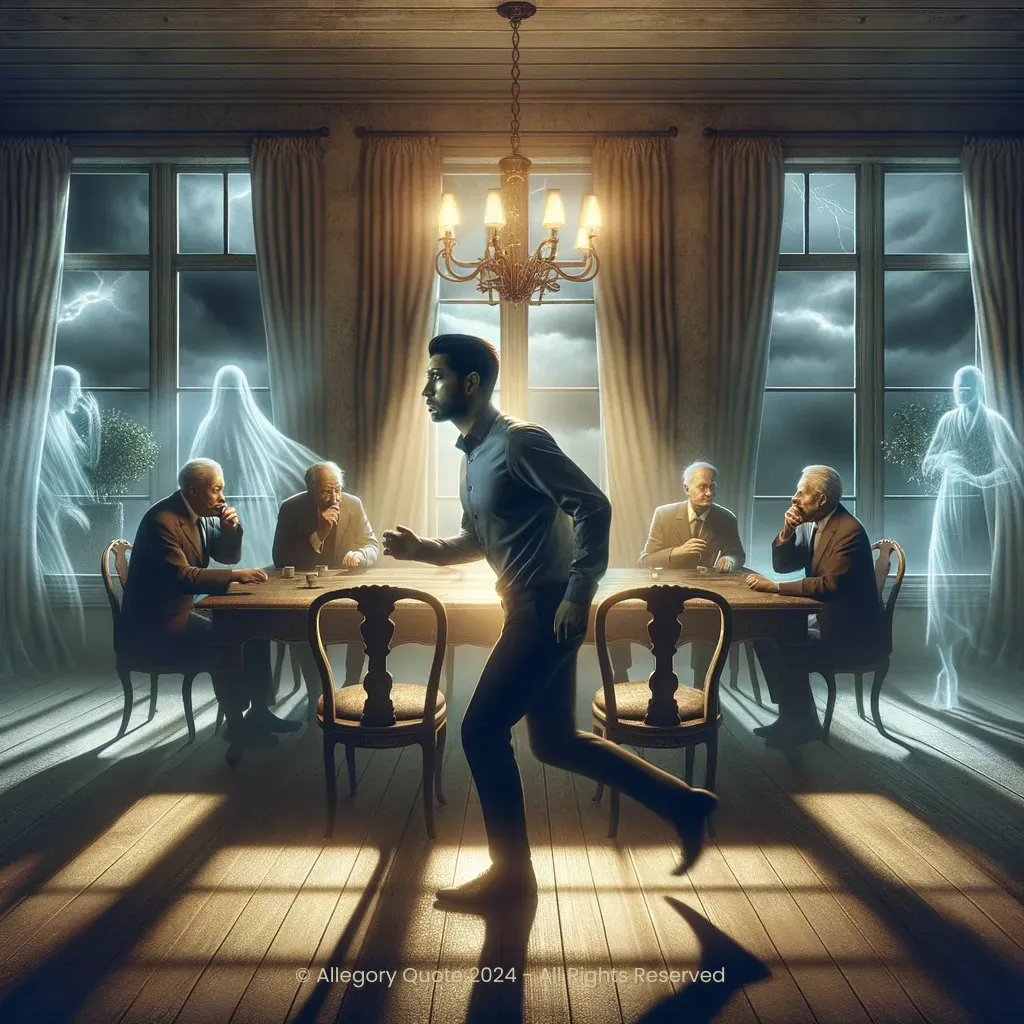”I have no trouble with my enemies.
I can take care of my enemies all right. But my damn friends, they'
re the ones that keep me walking the floor nights!"“

0
0
0
0
- Meaning
- This phrase reflects a profound disappointment and frustration that can arise from betrayal or problematic behavior by close associates and friends. While enemies are expected to be adversaries and hence easier to manage, friends and close allies, whose actions might be unpredictable or involve greater emotional investment, can cause more profound distress and sleepless nights.
- Allegory
- The central figure symbolizes the person experiencing the betrayal, dealing with the emotional unrest caused by the actions of close friends (represented by the ghostly, whispering figures around the table). The storm outside the windows conveys the external conflicts and challenges that seem more manageable compared to the internal strife. The chandelier casting light represents the harsh yet necessary illumination on truths and realities that come with betrayal. The long shadows and dimly lit atmosphere capture the somber and haunting consequences of misplaced trust, while the bright light suggests eventual understanding or confrontation with the truth.
- Applicability
- The teaching from this phrase can be applied to anyone's life by highlighting the importance of vigilance and awareness in all relationships. Trusting someone does not guarantee that they won't cause problems, and often, the emotional toll and complications arise from those closest to us. It emphasizes the need to maintain a nuanced approach to friendships and not to take loyalty for granted.
- Impact
- This phrase is often cited in discussions about loyalty, political alliances, and the nuanced complexities of friendships and trust. It has been used to underscore the unpredictable nature of human relationships and is often invoked in political and personal contexts to describe the pain and frustration of being let down by trusted friends.
- Historical Context
- Warren G. Harding served as the President of the United States from 1921 until his death in 1923. His administration was marred by scandals, such as the Teapot Dome scandal, which involved several of his appointees and associates. The phrase likely originated during or after his presidential tenure when the betrayals by his friends and appointees came to light.
- Criticisms
- Criticism of this phrase could argue that it promotes cynicism and distrust in personal relations. While undeniably insightful, it can be seen as fostering a negative outlook on human interactions and relationships, suggesting that even friends, who are supposed to be trusted allies, should be scrutinized closely.
- Variations
- Variations of this theme can be found in many cultures, warning against the potential betrayal by those close to us. For example, in many cultures, there are sayings akin to "Treat your friend as if he might become an enemy," which underscores the same cautionary philosophy.
-

The business of America is business.
-

The world must be made safe for democracy.
-

Read my lips: no new taxes.
-

Politics, when I am in it, it makes me sick.
-

Freedom is the open window through which pours the sunlight of the human spirit and human dignity.
-

Speak softly and carry a big stick; you will go far.
-

In times of peace, prepare for war.
-

Love all, trust a few, do wrong to none.
-

America is back.
-

The art of war is simple enough. Find out where your enemy is. Get at him as soon as you can. Strike him as hard as you can, and keep moving on.
No Comments